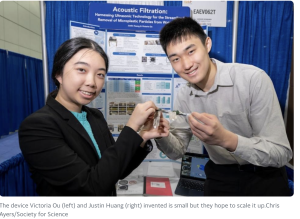Victoria Ou and Justin Huang, both 17 years old from Woodland, Texas won $50,000, from the Gordon E. Moore Award for Positive Outcomes for Future Generations. They invented a device that filters microplastics from water. In early research the high schoolers reached out to the EPA and were informed that the EPA does not regulate microplastics, and as a result does not remove them from wastewater.

Source Chris Ayer
Society Of Science
Harvard University estimates that there are 14 million tons of microplastics on the ocean floor. And as of 2023 the Plastic Soup Foundation, a nonprofit marine conservation organization, estimated there are 171 trillion microplastic particles floating in the ocean. The South Seattle Emerald newspaper has quoted research indicating adults consume 900 particles of microplastics a day. Surprisingly the highest concentrations of microplastics in foods have been found in apples and carrots.
The students’ device uses ultrasonic soundwaves to filter out the microplastics. It is inexpensive, environmentally friendly and efficient. They presented it at the Regeneron International Science And Engineering Fair in Los Angeles this year. It is said to be 94% effective in removing microplastics in a single pass.
Some health concerns related to ingesting or inhaling microplastics include the likelihood they may accumulate in the body and trigger immune responses, or something called local particle toxicity. Also, it is known that the particles contain harmful chemicals that can result in inflammation in the liver and digestive system, and can possibly affect the reproductive system.
The plan is to scale the invention and process for use in water treatment plants to help address this increasingly concerning environmental issue. Apparently many of the currently existing filtration processes are either inefficient or environmentally harmful.
